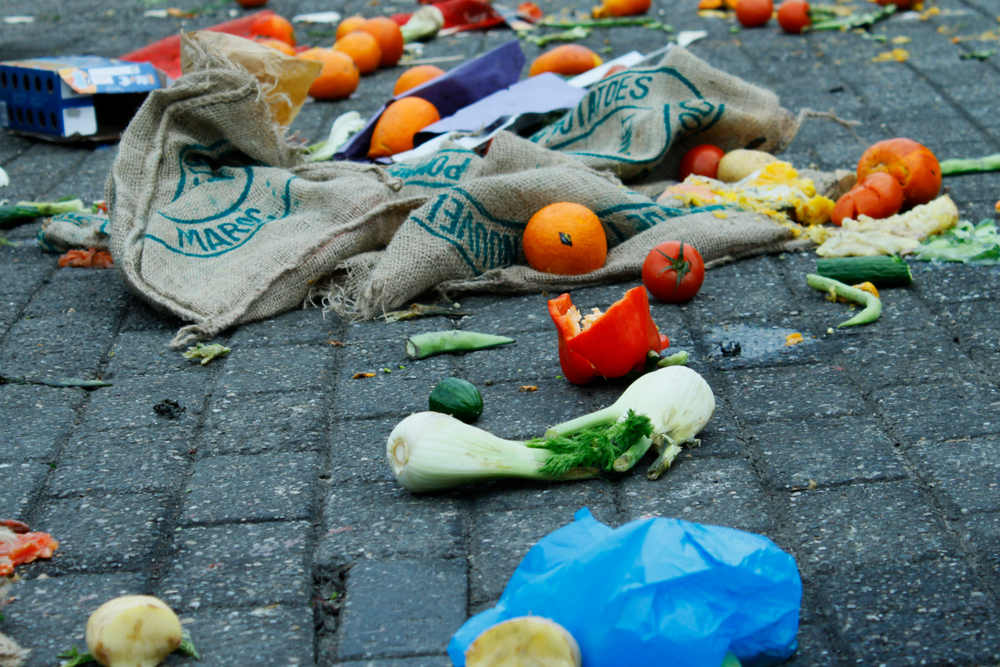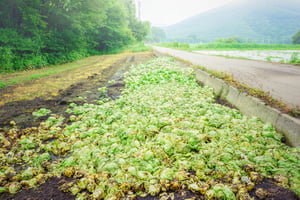
I’m horrified after reading so many recent articles on food waste and seeing so many colorful infographics depicting the sheer scale of the problem. The amount of food going to waste is staggering, and no matter how you measure it, it’s a huge cost we all pay for in some way or another.
But is ‘food waste’ the real problem? I’m going to go out on a limb here and say that food waste is a symptom of something else, something much more difficult to see, much less solve. Despite all the dramatic headlines and hand-wringing articles, food waste might instead be the unintended consequence or root cause of something even more significant. Poorly structured market incentives, poor procurement, bad management come to mind.
 I also think of the acres of fresh food we often discard in the field from overproduction or even from food-borne illness. This results of these incidents often wipe out entire categories of food. Romaine lettuce comes to mind when a single food safety incident leads to the carpet bombing of an entire region just to wipe out a single bad actor.
I also think of the acres of fresh food we often discard in the field from overproduction or even from food-borne illness. This results of these incidents often wipe out entire categories of food. Romaine lettuce comes to mind when a single food safety incident leads to the carpet bombing of an entire region just to wipe out a single bad actor.
To be clear, food-borne illness is not a small matter — I don’t want to be disrespectful in any way. Pathogens such as Escherichia coli O157: H7 (e.coli 157) are nasty bugs with dire consequences. But if you step back at look at it from a food waste point of view, the prevention policies and industry practices look more like the aftermath of a nuclear bomb. Yes, the speed of information is problematic, and conclusive traceability systems fall short. Maybe wiping out entire food categories is all we can really do, but…. must we always waste so much good wholesome food?
 I don’t want to fall into the trap of blaming the consumer either, even though consumers account for significant amounts of food that rots in their refrigerators and get dumped into the garbage bin. And I’m also not here to make you clean your plate at dinner either. However, the statistics I read show the consumer accounting for about 23% of all food waste.
I don’t want to fall into the trap of blaming the consumer either, even though consumers account for significant amounts of food that rots in their refrigerators and get dumped into the garbage bin. And I’m also not here to make you clean your plate at dinner either. However, the statistics I read show the consumer accounting for about 23% of all food waste.
Changing consumer behavior is a topic for another post, but for this Rant I'd like to focus on the supply chain: growers, packers, manufacturers, processors, brokers, distributors, retailers, restaurants.
Let’s start with the fact that fresh food is simply hard to manage. Calling food "fresh" means that it degrades fast, has a short shelf life and often has very specific handling requirements. Fresh food often comes from natural sources such as a field, a pasture or an ocean. Another problem is that natural sources do not lend themselves to consistent supply. Supplies are unpredictable as they ebb and flow with the whims of mother nature. When supply is disrupted, supply chains get reactive, people must intervene and the whole thing can go to hell in the blink of an eye. To put it mildly, the supply side of the fresh food supply-chain is lumpy.
 Match that up to the demand side. Consumer preferences and distribution channels are fragmented. Millions of consumers make food buying decisions within a million micro-markets every minute of every day. (Do a web search on "Facebook micro-markets and micro-targeting" to understand what I mean.) Micro markets are the norm across sophisticated consumer demographics and must be managed by millions of smart marketers, traders and retail establishments. Demand signals are fragmented; demand signals are difficult to predict; demand signals are lumpy.
Match that up to the demand side. Consumer preferences and distribution channels are fragmented. Millions of consumers make food buying decisions within a million micro-markets every minute of every day. (Do a web search on "Facebook micro-markets and micro-targeting" to understand what I mean.) Micro markets are the norm across sophisticated consumer demographics and must be managed by millions of smart marketers, traders and retail establishments. Demand signals are fragmented; demand signals are difficult to predict; demand signals are lumpy.
So, let’s match lumpy supply with lumpy demand, toss in a short shelf life and add the complexity of specific handling needs like temperature. What do you get? Food Waste! Food waste is a direct result of the mismatching of inconsistent demand with inconsistent supply. Matching demand with supply is quite difficult to achieve, but this is where we need to focus our energy to combat the food waste problem in the supply chain.
At Procurant, we understand the nuances of fresh food and are attuned to the perplexing issues of food waste. We think there’s a better way. One of the issues we clearly see is that technology has not kept pace. Food waste is a problem that must be dealt with by looking forward, but ERP’s and warehouse management systems are instead focused on gathering and analysis of historical information. Somewhat like driving a car by looking out of the rear-view mirror. If we’re going to tackle food waste as an industry, we must become better at looking forward, looking through the windshield so-to-speak, matching anticipated demand with projected supply.
Matching demand with supply. It sounds so simple, but achieving this alignment is practically impossible using yesterday’s data and obsolete technology. The answers are going to have to come from forward-thinking supply chain executives and forward-thinking operators that work in forward-thinking companies that use forward-thinking technology.

Forward-thinking solutions don't come from repeating the efforts of the past. Our industry can be slow to change, but at some point the waste of food — and of time — are going to catch up to us.
Here at Procurant, we're ready. Are you?
Lorem ipsum dolor sit amet, consectetur adipiscing elit

These Stories on Food Biz Buzz
Procurant USA LLC
475 Alberto Way - Suite 230
Los Gatos, CA 95032
1-669-221-1026
info@procurant.com
